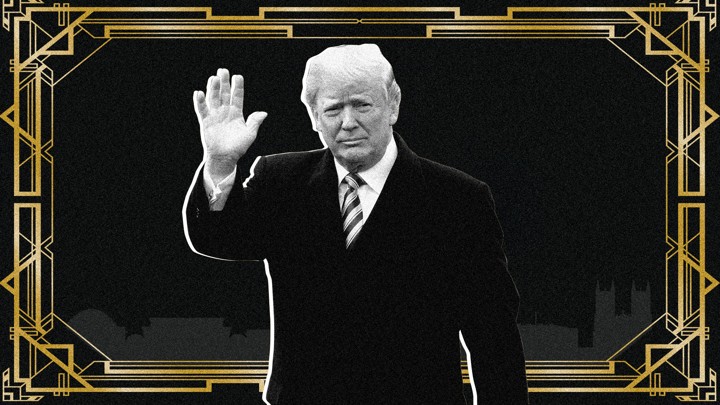How The Great Gatsby Explains Trump
There’s an eerie symmetry between Donald Trump and The Great Gatsby’s Tom Buchanan, as if the villain of F. Scott Fitzgerald’s 1925 novel had been brought to life in a louder, gaudier guise for the 21st century. It’s not just their infamous carelessness, the smashing-up of things and creatures that propels Tom’s denouement and has seemed to many a Twitter user to be the animating force behind Trump’s policy and personnel decisions. The two men, real and fictional, mirror each other in superficial but telling ways. Tom moves like Trump, aggressive and restless, and talks like him, with ponderous pride. He pickspersonal fights in public, “as though … it would be a privilege to partake vicariously of [his] emotions.” Tom surprises his dinner guests with disjointed political speeches, warning insistently that “civilization’s going to pieces.” His patrician mannerisms are shot through with flashes of anxiety, “as if his complacency, more acute than of old, was not enough to him any more.”
Tom—the Yale man, the football star, the spender of old money, the scion of what he calls the Nordic race—embodies the peak of social status in his century. Trump—the former Playboy-cover subject, the billionaire celebrity, the most powerful man in America—does the same for his. And their shared personality traits are the product of their shared relationship to power—the casual unreflective certainty that comes from inheritance, and enables its holders to wield its blunt force as both a weapon and a shield. Such power has its own logic; it responds not to social or moral rules, but to what it perceives as danger. It’s for these reasons that in 2018, The Great Gatsby reads like a warning. For as much as it is a story about the American dream, it is also a story about power under threat, and of how that power, lashing out, can render truth irrelevant.
Here’s the cast of The Great Gatsby, for those distant from their high-school English classes. Nick Carraway, the narrator, is a naive midwesterner who considers himself “one of the few honest people that I have ever known.” He takes a Wall Street job to escape hometown ennui and romantic commitment, renting a house in the less glamorous of twin Long Island suburbs and flirting idly with Jordan Baker, an athlete and cynical socialite. Next door to Nick is Jay Gatsby, a self-made man in terms of both fortune and identity, and across the bay is wealthy, beautiful Daisy Buchanan, Nick’s cousin and the love of Gatsby’s life. Daisy is married to Tom, who has a lover, Myrtle Wilson. And Myrtle, in turn, is married to a struggling mechanic, whose emasculation is just thorough enough to leave him the strength for revenge.
Fitzgerald draws a connection between class and character from the first pages of the novel, encompassing honor and honesty in Nick’s comfortable middle-class notion of “advantages.” Yet it soon becomes clear that the advantage afforded by wealth is less a natural inclination to honesty than it is the privilege of bending the world to one’s own convenience. Nick sums up this dynamic:
They were careless people, Tom and Daisy—they smashed up things and creatures and then retreated back into their money or their vast carelessness, or whatever it was that kept them together, and let other people clean up the mess they had made.
Money is a shield between the careless wealthy and the consequences of their actions, cutting them off from the reality of what they have done and what it means. Thus, although Tom (like Trump) has a reputation for having cheated on his wife, he decries the loss of family values, transforming easily “from libertine to prig.” His actions, however confused, are in his own mind “entirely justified”—so that talking to him feels, in the end, like “talking to a child.” Tom throws the weight of his denials around in tandem with his money, dismissively contradicting a man who sells him a dog on the street. When George Wilson, the mechanic, implies that Tom has been slow to produce the car he’s promised to sell him, all it takes is Tom’s cold “No” to make clear that he’s overstepped his place.
Yet Tom is far from the only character to use his wealth and status as a means for deceit. Jordan, similarly privileged, is “incurably dishonest,” relying on the assumed codes of polite society to protect her reputation just as she relies on drivers more careful than herself to stay out of her way. Gatsby acquires a new identity when he acquires his fortune, the excess of his belongings—shirts and books and oranges and flowers—matched only by the proliferation of stories about his roots. Nick, more subtly, aspires to do the same: He buys a set of financial books with “that familiar conviction that life was beginning over again with the summer,” seeking amid their “shining secrets” a way out of his old life and out of “that tangle back home” with a woman he’s rumored to be courting.
Even Daisy, idealized as she is, demonstrates the relationship between money and its power to override reality. As Tom’s wife, she personifies the kind of wealth that he possesses and other men can only pursue: In Gatsby’s words, “Her voice is full of money,” which is to say it’s seductive, hard to catch, and compels her listeners to belief, though she rarely says anything she means. At one point, Nick doesn’t notice her insincerity until the moment she stops speaking. When she does, he interprets her smirk “as if she had asserted her membership in a rather distinguished secret society to which she and Tom belonged”—signaling the couple’s elite status by flaunting how little they need to care for the truth.
Trump displays a similar carelessness. Amid the cloud of easily disprovable statements that surrounds his administration, he has also, strikingly, used falsehoods to define himself and his office—spinning claims of the largest-ever inauguration crowd and a landslide electoral victory and a record number of Time covers into the mythical biography of a superlatively powerful self. Trump doesn’t appear to care for realism, and maybe that’s the point: Whereas a social climber like Gatsby is meticulous with the details of his self-invention, stocking his library with real books though his guests would not be surprised by cardboard, Trump knows that the secret of power is effortlessness; in his world, as in Tom and Daisy Buchanan’s, wealth means less if you have to work for it. The president inspires loyalty through sheer swagger, telling it like it is even when it isn’t, speaking reality into existence: It is so, because I say so.
What can rouse such complacency into action? Only, perhaps, the notion that what Nick terms the “rather distinguished secret society” of the powerful is under siege. Tom expresses this anxiety early on in The Great Gatsby, when he warns from the head of his own opulent dinner table that “the white race,” having “produced all the things that go to make civilization,” must “watch out or these other races will have control of things.” He wants, above all, to preserve the ease with which he sets the terms of his world—“to ensure,” as Ta-Nehisi Coates has written, “that that which all others achieve with maximal effort, white people (particularly white men) achieve with minimal qualification.” Tom is motivated by the same reactionism that Coates has documented as one of the forces that crowned Trump the successor to America’s first black president.
Tom’s fears aren’t brought to life, however, until he comes face-to-face with Gatsby—the man who “sprang from his Platonic conception of himself,” whose smile, which “believed in you as you would like to believe in yourself,” reflects back to all who behold it the reification of their dreams. There’s convincingscholarship to suggest that Fitzgerald may have created Gatsby—with his “tanned skin,” close-cropped hair, and studied diction—as a light-skinned black man passing for white, and this, to the white-supremacist Tom, would have been the ultimate insult. It’s enough, though, that Gatsby acts, and leads Daisy to act, on terms that Tom has not defined—so that Tom finds his wife, and all of the wealth and power she represents, “slipping precipitately from his control.”
The tragedy unfolds from there, and strangely, it parallels Trump’s rise. Tom attacks Gatsby’s origins the way Trump demanded Barack Obama’s birth certificate, denouncing Gatsby as “Mr. Nobody from Nowhere.” There is a scene; Daisy, unable at last to embody Gatsby’s romantic ideal, drives in tears toward home, running Myrtle down with Gatsby’s car. And Tom (after conspiring, the novel suggests, with Daisy) turns Wilson’s need for vengeance to his advantage—just as Trump, with his anti-immigrant rhetoric, played to the previously unspeakable fears of those who felt their country had been takenfrom them. Tom names Gatsby as the source of Wilson’s grief—his wife’s lover and her killer—and Wilson kills both Gatsby and himself, while Myrtle’s real lover (Tom) and killer (Daisy) retreat unharmed. Nick’s famous condemnation comes here—“They were careless people, Tom and Daisy.” This censure is all the more scathing for the moral emptiness of the Buchanans’ petty sin, and all the more futile: The careless, by definition, pay no attention to whom they hurt.
Like Trump, who ran on promises to ban Muslims and deport Mexicans, Tom scapegoats an outsider as a threat to what his community values. Tom assigns an identity to hazy, formless discontents and fears, just as Trump has declared a national crisis that he alone can fix. The president lives in a widening circle of disgraced former aides and advisers; likewise, Tom leaves behind him the bodies of those who have done, or been blamed for, his dirty work. And like Trump, who’s made numerous unfounded claims to cast himself as a victim, Tom cherishes his own implacable sense of what’s right and wrong and real.
And this, today, may be the most potent warning of Fitzgerald’s novel. Because when Tom and Daisy smash up the things and creatures around them, they don’t just demonstrate their own carelessness about truth and consequences. They also expose the misconceptions of their witnesses, revealing that Gatsby is blinded by his own dreams; that Jordan is naive to trust in other people’s honesty; that Nick has, as he confesses to Jordan, been lying to himself and calling it honor. So too has Trump exposed the gaps in America’s ideal of itself—the ugly currents of its power, the limits of its possibilities. He’s forced a reckoning, brought the country’s vision closer to its reality.
Yet it’s difficult, now, to know what a sense of reality is good for, when the disconnect between truth and the truths of power is so stark. In the penultimate scene of The Great Gatsby, Nick confronts Tom about what he told Wilson—and Tom is so certain of the justice of his actions that the only thing Nick can do is shake his hand. “There was nothing I could say,” Nick muses, “except the one unutterable fact that it wasn’t true.”
We want to hear what you think about this article. Submit a letter to the editor or write to letters@theatlantic.com.
ROSA INOCENCIO SMITH is an assistant editor at The Atlantic.


No comments:
Post a Comment